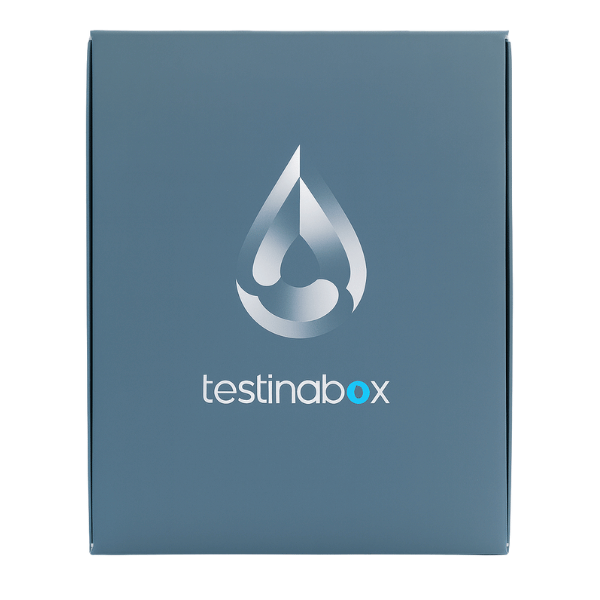

Support your hormonal, reproductive and metabolic wellbeing with our Women’s Hormone Plus Profile – At-Home Blood Test. This enhanced panel combines core female hormone and thyroid markers with Leptin for added insight into appetite regulation and weight-related hormone signalling. This profile measures LH, FSH, Estradiol (E2), Progesterone, Prolactin, Testosterone, TSH, Leptin and Full Blood Count (FBC) to assess cycle regularity, ovulation, fertility, thyroid balance, and metabolic hormone function — helping you understand how your hormones may be affecting your mood, energy, weight, and menstrual health. Ideal for women with irregular cycles, fertility concerns, PCOS-type symptoms, thyroid-linked issues or weight-related hormonal imbalance, this test provides a more complete picture of your hormonal health than a standard female hormone test.
Women’s health is shaped by the delicate balance of reproductive, thyroid and metabolic hormones. When these become imbalanced, symptoms such as irregular or heavy periods, fertility difficulties, weight changes, acne, low libido, fatigue, or mood swings may appear.
The Women’s Hormones Plus Profile from Vitalync Diagnosis builds on our core hormone panel by including Leptin — providing deeper insight into how appetite regulation, weight control and metabolism connect with reproductive and thyroid health.
Follicle-Stimulating Hormone (FSH) — Assesses ovarian reserve and follicle development.
Luteinising Hormone (LH) — Triggers ovulation; imbalances are often seen in PCOS and anovulatory cycles.
Estradiol (E2) — Key oestrogen regulating cycle timing, follicle growth and endometrial health.
Progesterone — Confirms ovulation and luteal phase adequacy; low levels may indicate ovulation issues.
Prolactin — Raised levels can disrupt ovulation and menstrual regularity.
Testosterone — High levels may contribute to acne, excess hair growth and cycle disruption; low levels may affect libido, mood and energy.
Thyroid-Stimulating Hormone (TSH) — Thyroid balance influences energy, mood, menstrual cycles and metabolism.
Leptin — A key hormone linked to appetite control and fat-mass signalling. Abnormal levels may be associated with PCOS, obesity, or low energy availability.
Full Blood Count (FBC) — Screens for anaemia, infection or inflammation that may worsen fatigue or menstrual symptoms.
This enhanced women’s hormone test is ideal for:
Women with irregular, absent or heavy periods
Those planning pregnancy, experiencing fertility difficulties or monitoring treatment
Women struggling with weight gain, difficulty losing weight or suspected metabolic imbalance
Individuals with fatigue, low libido, mood swings or hormonal acne
Women with known or suspected PCOS, thyroid imbalance or metabolic hormone disruption
Anyone seeking a more comprehensive hormone and metabolic health check during lifestyle change or treatment
For best accuracy:
FSH, LH, Estradiol (E2): Cycle days 2–5
Progesterone: ~7 days before expected period (e.g., day 21 of a 28-day cycle)
Leptin: May vary with food intake — morning fasting sample offers most consistency
Your clinician may advise different timing depending on cycle length, contraception/HRT or treatment plan.
By combining reproductive, thyroid and metabolic markers, this profile helps identify whether symptoms may be linked to:
Ovulation issues or reduced ovarian reserve
Oestrogen, progesterone or thyroid imbalance
PCOS or raised androgens (Testosterone)
Appetite and metabolic signalling issues (Leptin)
Results can guide more targeted lifestyle changes, clinical decisions, supplementation or further investigation, helping improve hormone balance, cycle health and overall wellbeing.
Order online quickly and securely
Visit your nearest Vitalync Diagnosis partner blood draw clinic (no GP referral required)
Post your sample to our accredited UK laboratory using the prepaid pack
Receive your results securely via email
Hormone levels vary with time of day and menstrual cycle phase
Do not stop prescribed medication or contraception unless advised by your clinician
Results support assessment but should be reviewed with a healthcare professional
Our partner laboratory, Medical Diagnosis, is UKAS ISO 15189 accredited, and Medical Diagnosis Victoria is registered with the Care Quality Commission (CQC), ensuring all diagnostic testing meets the highest UK standards of quality and accuracy. Medical Diagnosis Victoria is authorised to provide Testosterone Replacement Therapy (TRT) and related clinical services, which are delivered following appropriate medical assessment by GMC-registered doctors with extensive clinical experience.
More About It